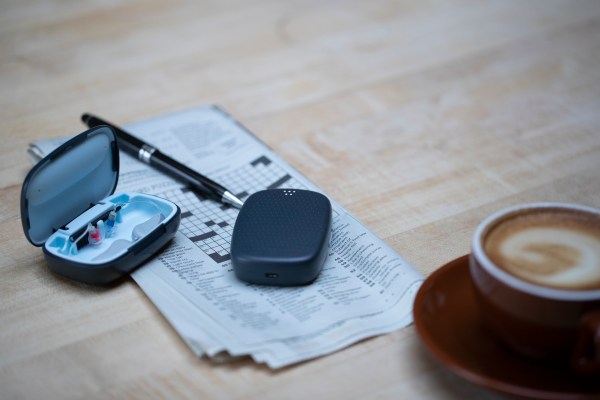A few years ago, Whisper president and co-founder Andrew Song was talking to his grandfather about his hearing aids. Even though he spent thousands of dollars on a medical device designed to improve his hearing, and in the process his quality of life, he wasn’t wearing them. Song’s co-founders had had similar experiences with grandparents, and as engineers and entrepreneurs, they decided to do something about it, to try to build a better, more modern hearing aid.
Today, the company emerged from stealth with a new hearing aid built from the ground up. It uses artificial intelligence to learn and adjust in an automated way to different hearing situations like a noisy restaurant or watching TV. And you don’t pay thousands of dollars up front, you pay a monthly fee on a three-year subscription, and you get free software updates along the way.
While it was at it, the company also announced a $35 million Series B investment led by Quiet Capital, with participation from previous investors Sequoia Capital and First Round Capital. The startup has raised a total of $53 million to build the hearing aid system that it is announcing today.
Those discussions with his grandfather prior to starting the company led Song to wonder why he wasn’t wearing those hearing aids, what were the challenges he was having and why that wasn’t working for him — and that led to eventually launching a startup.
“That really inspired us to build, I think, a new kind of product, one that could get better over time and better support the needs of people who use hearing aids, and be a hearing aid that gets better, but also one that could use artificial intelligence to actually improve the sound that somebody gets,” Song explained.
While the founding team had a background in technology and engineering, they did not have expertise in hearing science, so they brought on Dr. Robert Sweetow from the UCSF audiology department to help them.
The technology they’ve built consists of three main components. For starters you have the hearing aids themselves that fit on the ear, along with a pocket-sized external box that they call the Whisper Brain, which the company says, “works wirelessly with the earpieces to enable a proprietary AI-based Sound Separation Engine,” and finally there is a smart phone app to update the software on the system.
[gallery ids="2061352,2061353,2061354"]
It is this AI that Song says separates them from other hearing aids. “In the day-to-day rough and tumble when you encounter a more challenging experience, what we call our sound separation engine, which is the kind of AI model that we’ve built to help with that, and that’s what’s going to be there to help do that signal processing — and we think that’s really unique,” he said.
What’s more, just like a self-driving car learns over time and benefits from the data being fed back to the company from all drivers, Song says that the same dynamic is at work with the hearing aid, which learns how to process signals better over time, based on an individual’s experience, but also all of the other Whisper hearing aid users.
The company is offering these hearing aids through a network of hearing aid professionals, rather than over the counter, because Song said that the company recognized that these are complex instruments and it is important to keep audiologists in the loop to help fit and support the hearing aids and work with Whisper customers over the life of the product.
Whisper offers these hearing aids on a subscription basis for $179 per month on a three-year contract, which includes all of the hardware, the software updates, on-going support from the hearing care pro, a three-year loss and damage insurance and an industry-standard equipment warranty. They are offering an introductory price of $139 per month for a limited time.
At $179 per month, it comes to a total of $6,444 over the three-year period to essentially rent the aids. At the end of the subscription, customers can renew and get updated hardware or give the hardware back. They do not own the hearing aids.
It’s worth noting that other hearing aid companies also use AI in their hearing aids, including Widex and Starkey, neither of which require an external hub. Many hearing aid companies also offer a variety of payment and subscription plans, but Whisper is an attempt to offer a different approach to hearing aids.
